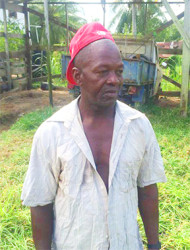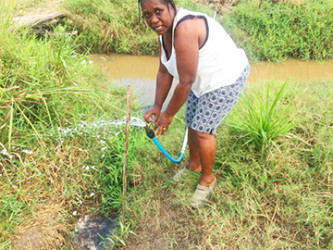After decades of relying on the rain and the river for their water supply, many residents of Free and Easy, West Bank Demerara, are now accessing potable water through a pipeline system that was recently installed in the village.
“It was hard, hard, hard, but we didn’t have a choice and we had to endure all those years,” Clive Thomas, a farmer who has been living in the village for about 60 years, told Stabroek News yesterday.

Thomas recalled that in all those years the people of the community would have to rely on the rain to provide them with water, collect it from the river, or walk to nearby villages and access it there.
The little village, which is tucked behind Vive La Force, is about five miles from Patentia on the West Bank Demerara. Thomas said farmers make up the majority of the 300 residents and they depend on their cash crops and cattle to earn their livelihoods.
It is estimated that over 40 households are benefiting from the $10 million distribution network that was installed by the Guy-ana Water Incorporated (GWI).
It had been announced last month that the service to the village was as a result of the intervention of Junior Communities Minister Keith Scott, who had held a meeting with residents in August, where he was alerted to their plight.
A GWI statement said Scott committed to install-ing the community’s first potable water distribution network, while emphasising that the lack of safe water in the community was unacceptable and that he would personally pursue the project.
GWI added that infrastructural work, including the installation of pipe-lines, distribution and transmission mains, started in late August. The entire network consists of in excess of 6,000 feet of pipelines.

Thomas said having access to the water now is “a great feeling” and noted that it was difficult to how much it meant to villagers.
“It’s a strange feeling now having the water, the clean water, coming straight to our yards. It takes a lot of stress off of our backs and we are ever grateful to the government and God for doing what they can,” he said.
“We all know that they can’t do everything at once and we are patient. My father has been living here for 96 years and all of these lands are ancestral lands that have been passed down from generations over time and ever since then we have never had water or electricity,” he added, while noting that they village received electricity some three years ago.
“Not everyone has in their yard as yet because I think something happened to the machine that was digging the ground but it’s still way better than it was before, you know. Now, people don’t have to far to get water, you can now just go by your neighbour and full and it has made everyone in the village happier,” Thomas said.
Another resident, Roxanne Charles, said “it was real punishment” without water. She had previously lived on the East Bank Demerara, where she had access to water and electricity, before she moved to Free and Easy 20 years ago.
“Especially in this dry season, when it’s not raining and everything is dry, it’s usually hard to get water, which can be detrimental to us farmers that heavily depend on the water,” she said, while calling the new distribution system “God sent.”
While Thomas and Charles said living in ‘Free and Easy’ is as the name suggests, there are other things they would like to see the current government address.
“When the road gets wet, it gets soft and it is really hard to travel through. And we know the government can’t do everything at once but we would love to have an all-weather road, especially since the villages after are spread out and you can’t just walk and reach them,” Charles said. She added that the government should also look into building a recreational centre or a play field for the children of the community.
“There [are] a lot of kids here and there is a lot of land but really and truly they don’t have anywhere they can go and play. The next village that would have something similar is about 2 miles away,” she said.
“In terms of school, they would usually attend the Vive La Force School and since that is about two miles away. They would have to walk or ride or whenever the estate vehicles pass they would hitch a ride and go to school,” she added.




